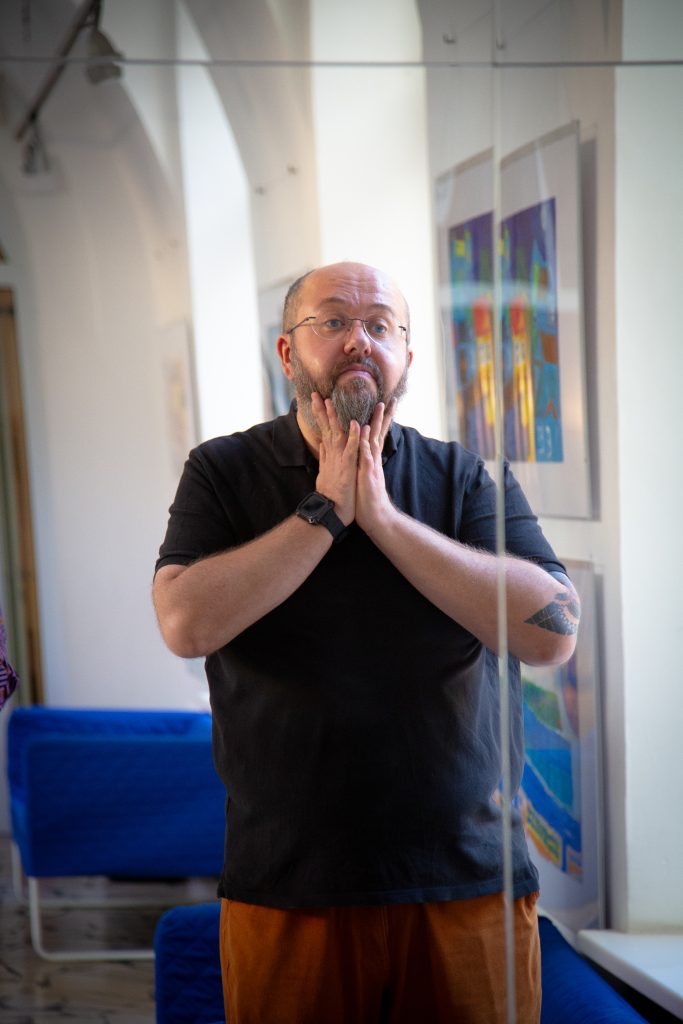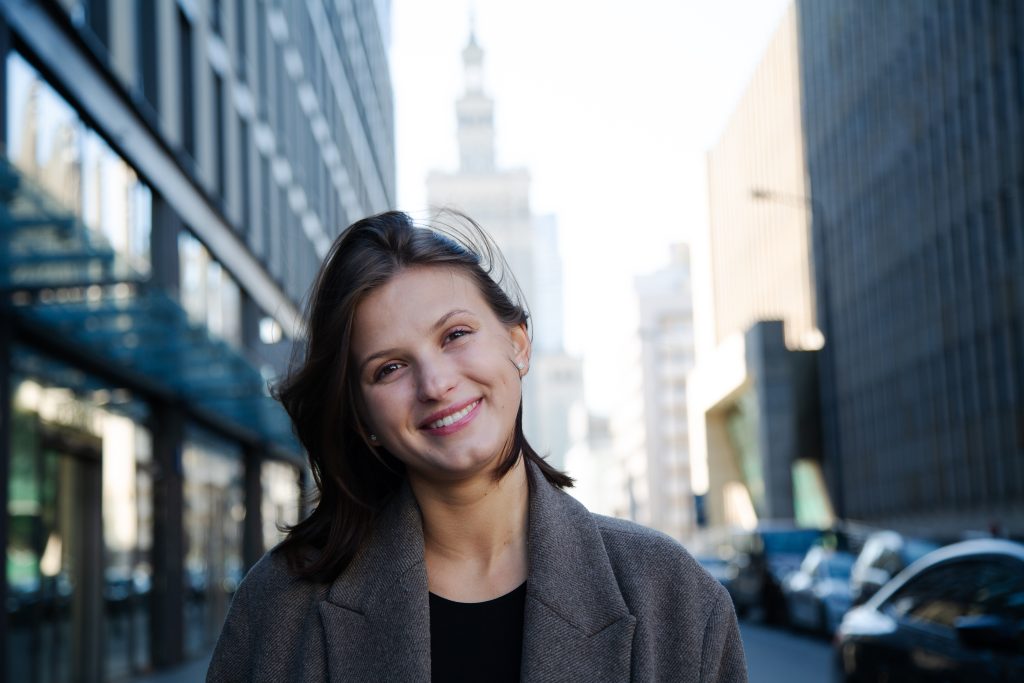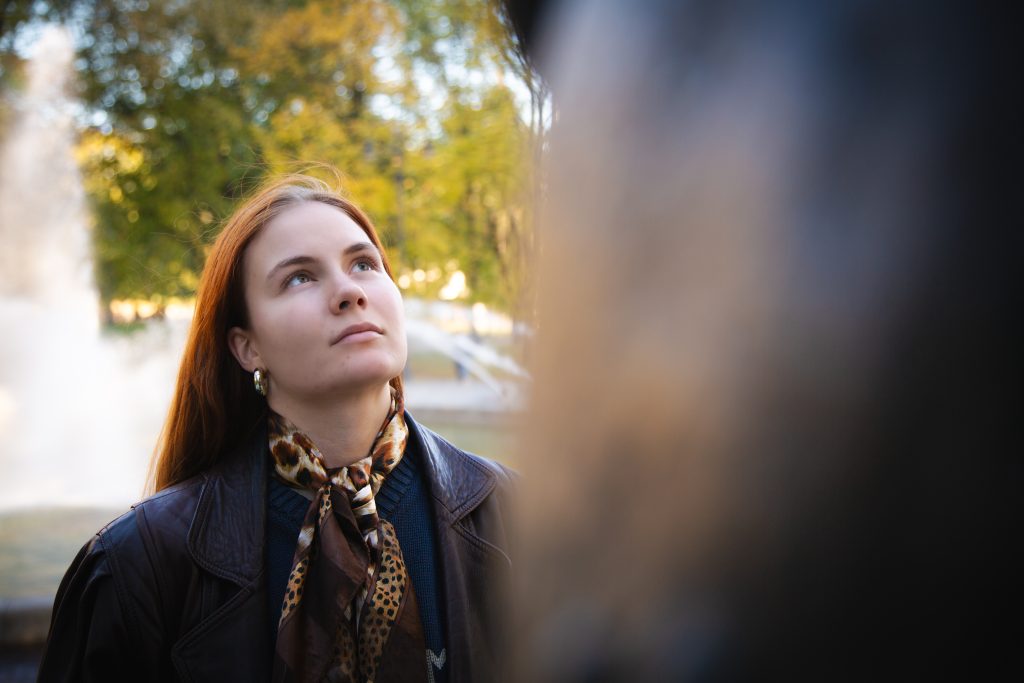The End and the Beginning
Searching for hope and love in a divided Europe in the middle of war and hate – certainly, it is not the easiest quest for the new generation in Poland.
(Reading time: 11 minutes.)
Photos & videos: Heli Pekkonen
Text: Johannes Roviomaa
Poland is a strongly divided country with a painful past but endless resilience. This story brings together an expert of anti-radicalisation and young people who want a future in Poland to be feminist and a World where children’s rights are taken care of.
In the poem “The End and the Beginning,” Wislawa Szymborska (1923–2012), a Polish poet, winner of the Nobel Prize for Literature, writes:
“After every war someone has to clean up. Things won’t straighten themselves up, after all. Someone has to push the rubble to the side of the road, so the corpse-filled wagons can pass…”
In her poem Niektórzy lubią poezję (”Some like poetry”) Szymborska writes that “only two of a thousand people care about art”.
Can the same thing be said about peace?
WARSAW, Poland. It’s mid-October, the sun is reflecting a hint of the light, but little warmth remains. The leaves on the trees in the park will soon disappear. As we walk in Warsaw’s historical Old Town to meet our experts of peace, we are struck by how a vibrant capital city, home to almost two million people, is surprisingly quiet.
A peaceful piano playing echoes down the hallway from the music hall. Elżbieta Siczek, Vice Director of Warsaw Centre for Cultural Education, gives us a warm welcome and leads us into the basement.
Our aim is to deepen our understanding of the Polish peace work field at the moment. What is happening in the civic society – in the shadow of war? In the midst of all the different catastrophes, questions of security and peace are increasingly on people’s minds.
“Feeling safe is an important part of basic human needs. Preventing radicalisation and extremism is at the heart of peace work”,says Jacek Purski, 43, Chairman of the Institute of Social Safety (Instytut Bezpieczeństwa Społecznego).
Purski started the organisation ten years ago because he wanted to understand better what is bubbling under the divided society. Now IBS is doing education, research and intervention – trying to find pathways away from the labyrinth of hate.
Purski says that his journey to peace work is “a mixture of passion and personal history”. First he started career as a journalist but later became a researcher and expert of radicalization and hate crime prevention.
While studying, he joined an anti-racist group doing grassroots level work, education initiatives and monitoring racist incidents in Poland.
”There is still not enough effort to tackle and prevent the hate”, says Purski, who was also a member of the Expert Pool of Radicalisation Awareness Network.
Purski is now working full-time on radicalisation, extremism and hate crime prevention and mediation in Poland. He is cooperating with the authorities, the police, social workers, teachers and various organisations.
A nation of 38 million people is divided between rural and urban, rich and poor, religious and non-religious, the elderly and young generations and so on. Poland has a relatively high rate of hate crimes in comparison to the population.
Impressions of Poland are a bit controversial. Poland is currently investing more in weapons than any other European country, with the aim to be the largest military power in Europe. There is a logical reason for that from the past.

Jacek Purski
“The horrors of World War II, the Holocaust and living under a totalitarian regime are things that must not be forgotten. But simply looking at history will not bring answers to the present”, says Purski.
History of Poland is tragic, dark and cruel. The Poles suffered the bloodiest genocide in modern history during World War II. Nearly three million Jews, and around 2,5 million other Poles, died in Poland. Relative to the size of its population, Poland suffered more than any other country.
Polish national poet Adam Mickiewicz (1798–1855) said that “Poland is like Christ among nations: suffering for others.”
Nearly 90 percent of Warsaw’s historic centre was destroyed by Nazi troops. Half of the population of the city were killed or deported. Those people who were not killed by others, died of epidemics or starvation.
The shadow of history follows, but there are also tensions within the country. Every year, there are some hate crimes towards the Auschwitz Museum building. There are also groups in Poland that are violent towards minority groups. An example of this is the firebombing of a Warsaw’s synagogue, by a 16-year-old teenager in 2024.
Purski recently moved to a house near the Auschwitz Museum with his family. He has Polish-Jewish ancestry.
Through his work, Purski wants to prevent Poland from hatred, radicalisation and extremism. He says that in the midst of all this hatred and confrontation, there is another reality. It is possible to break free from anger and hate. There are people who change their ways of thinking and regret their actions. In the middle of hate and violence, there is also space for forgiveness and justice.
“Peace processes start inside of each individual. The first step is to talk about peace in a safe space. ” -Jacek Purski
Before Russia’s full-scale invasion of Ukraine on 24th of February 2022, Poland was heading towards Hungary, slipping away from democracy.
Today, hatred, misinformation and disinformation and propaganda are easily spreading on the internet and social media, says Purski.
“Those who spread anti-Ukrainien hatred are part of the pro-Russia propaganda machine”, Purski says.
But evidently Polish have also resilience. Now a new generation tries to find pathways out from the current war in Europe, which has impacted Poland crucially.
When Russia attacked Ukraine in full-scale, a new sense of solidarity emerged in Poland. The first refugees were invited into ordinary people’s homes. Neither the city nor politicians had time to react as quickly as citizens, says Purski.
For example, Purski’s colleague, who had studied Ukrainian language twenty years ago, went to the Warsaw train station to help. He handed out sandwiches to refugees and helped people to find shelter.
Now Poland’s history is also defined by the hundreds of thousands of Ukrainian women and children who are currently building their future in the country that gave them shelter and help.
The border of Ukraine is about 220 kilometres from Warsaw. Poland is one of the European countries that has supported Ukraine and Ukrainians the most. Since January 2022, over 7.5 million refugees from Ukraine have crossed the Polish border. 1.5 million Ukrainians have stayed in Poland temporarily, or who knows, permanently.
Society is complex. Some forces are pushing the world towards hatred and violence, and some forces are trying to prevent it from happening. An eternal dichotomy of light and darkness, destruction and construction, love and hate.

Wiktoria Novak
”It’s not just about women who wanted to vote. It is about how all voices are heard in our society” – Wiktoria Novak
Youth in Poland are trying to build pathways towards a more sustainable future
”I really want to live in Poland which supports women rights”, says Wiktoria Nowak, 22, social activist and co-founder of the #GirlsGoVote. She is also a Parliamentarian and Student Senator at the University of Warsaw.
For the last eight years, the country was led by the conservative-right-wing Law and Justice Party. It left society deeply divided. The party opposes the rights of sexual and gender minorities, abortion and immigration.
Couple months before the election in Poland 2023, Nowak and her friend were thinking about how to get young women to vote in parliamentary elections. They got an idea at a party, and decided to make videos on social media. “Girls for Election”, was the message, simple as that.
Eventually videos went viral, and got over two million views, says Nowak. Similar videos and campaigns started to spread on Tiktok, Instagram, Youtube, Facebook like mushrooms after the rain.
Nowak was invited to main TV and radio channels and different events all over Poland. Young people especially were inspired and started to recognize Nowak in the campus and on the street.
”Poles don’t get excited about voting because they think their vote doesn’t make any difference. My generation is different. We don’t believe so much in authorities”, Nowak says.
In October 2023, the liberal opposition won the parliamentary elections in Poland. Polish turnout reached 74.4 percent, higher than in the free elections since the fall of communism in 1989. The largest party was still PiS but without the ability to form a winning coalition in the 460-member lower house of parliament.
A surprising number of people under 29 found their way to the ballot box. Usually, turnout among young voters in Poland has remained relatively low.
”It’s not just about women who wanted to vote. It is about how all voices are heard in our society”, Nowak says.
Nowak says that one of Poland’s internal challenges is strong polarization. She says that Poles are afraid to talk about politics, even within their own families.
“We need to stop talking about ‘us’ and ‘them’ “, says Nowak.
Nowak says that Poland is not the easiest country to be a feminist, or social activist and well, a young woman. She has witnessed discrimination because of his gender and age. Now she is cautiously optimistic that Poland could be heading in a “better direction” in the future.
“Children's rights do not apply in war.”
We are sitting in a park in the centre of Warsaw, right next to the Palace of Culture and Science, which was originally a gift for dictator Joseph Stalin. Next to us stands a statue of Janusz Korczak (1878–1942), Polish-Jewish paediatrician, educator and author.
”His dedication to kids is something which really keeps me in this field”, says , She is studying psychology and law at the University of Warsaw.
Korczak, who tried until the very end of his life, took care of orphaned children and calmed their fear and anxiety in Treblinka concentration camp. Korczak and the children were murdered in the gas chamber, shortly after arriving at the camp. It almost feels like Europe has forgotten its past.
When Domek was a child, she was interested in the concept of happiness. What happens in our brains when we feel happy? Four years ago she turned her eyes to brain development, neuroscience and international law
”I want to focus on research in the neurodevelopmental field and use that knowledge to change legal systems”, Domek says.
She became interested in how children are used as soldiers in conflict zones / armed conflicts around the World. Recruitment of child soldiers is rising, despite the global commitments.
”I’m currently trying to understand how to talk about children’s rights and equality”, Domek says.
Domek wants to shake up people’s understanding of children’s rights. Domek says that the Convention on the Right of the Child is one of the greatest achievements of humanity, but it is under threat in many parts of the world right now. According to the Unicef’s report one in six children live in the middle of armed conflict.
She would like to combine her knowledge of psychology and law to protect children, and be an ombudsman of children right first in Poland, then nationally. Domek would like to work for UNICEF or the United Nations.
It seems that Poles are psychologically scarred but not disheartened. The voice of the younger generation is resolute.

Paulina Domek
Letters from the Underworld
Where could we try to find a glimmer of hope for our troubled minds, prayer for the restless? Cities can be rebuilt, but human minds and hearts do not work in the same way. The war did not destroy everything. At least the cellars remained. Life is bustling underground, even though there is no light.
We have conducted most of our interviews on the lowest floors or in the basements of residential buildings. Beneath the surface of society, there is the possibility of resistance, for good or bad. Cellars can hold nightmares and dreams.
”Definitely there are times in which bringing hope to everyday life is difficult. But when you are surrounded by people with a common aim of peace work or confronting radicalization, extremism, you sooner or later will find hope there”, says Jacek Purski.
The crucial challenge for democracy is how to combine learning from history with the ability to keep the future open to entirely new forms of thinking and acting. In times of uncertainty, people reach out for historical analogies – but history may not provide answers to our problems that we are experiencing.
”I’m trying to change the World around me. Everyday the impact is bigger. I can feel it in my bones”, says Wiktoria Nowak.
Purski wants to build a Poland free of violence, Nowak wants to see young people, especially women, at the ballot box, Domek wants to protect children and shape international law.
The front line of army troops are constantly moving in the battlefield. The same applies to the shadow of war, where people work in civil society – trying to solve existential crises without hatred and violence.
They believe in peace processes and are trying to imagine a future in which the World – and the Polish society – is organised a bit differently.
Should thoughts of peace be excluded from our brain system? Should the idea of peace be hidden in the cellar, where it can be retrieved one day?
CRITICAL QUESTIONS OF PEACE – POLAND
A Question of Values
What Kind of Change Do We Want?
Why Do We Live in this Polarization?
Do We Know All the Answers?
Where Can We Find Peace In Ourselves?
Could We All Learn About Peace?
